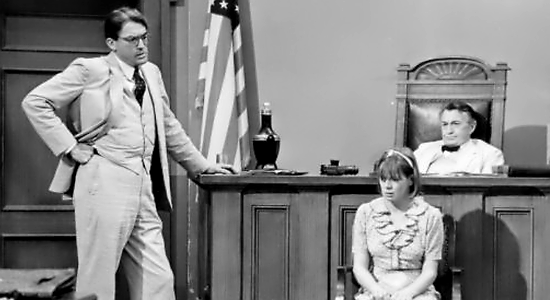I was raped.
I was raped by a large black man who entered my home at my invitation. I was on the porch, and he came along, and there was a chiffarobe in the yard Papa brought in to chop up for kindling. Papa wanted me to do it while he was off in the woods, but I wasn’t feeling strong enough then.
That’s when Tom Robinson came by.
“Come here, n—–, and bust up this chiffarobe for me,” I said. “I gotta nickel for you.” He looked big and strong, like it would be easy for him to do the job. He came into the yard, and I went into the house to get him his nickel.
Before I knew what was happening, he was on me. He ran up behind me, grabbed me around the neck, cursing me and saying dirty things. I fought, I yelled, but he had me around the neck. And then he hit me over and over again. He threw me on the floor and choked me and took advantage of me.
The next thing I knew, Papa was in the room standing over me, yelling. “Who done it? Who done it?” Then I fainted. The next thing I knew, Sheriff Tate was pulling me off the floor and leading me to the water bucket.
When I got to trial, I was scared. Scared of that defense attorney, Atticus Finch. I’d seen him tear apart my daddy on the witness stand, make him look foolish, showing that he was lefthanded and that the bruises on my face matched his handedness. I knew he was after me the moment he got up from that defense table.
Sure enough, he started in on me. He asked me about my home life, showed that my daddy was a drinker, that we were too poor for shoes, that we were white trash. At least that’s what he was trying to show.
Then he got to his point. “Has he ever beaten you?” he asked about my daddy. I told him that my pa had never touched a hair of my head in my life. I told him that I’d seen Tom Robinson come by the house before. And then he asked me if I specifically remembered Tom Robinson beating me.
That’s not how rape works. When I finally decided to share my story, it had ambiguities and gray areas, because that’s what I experienced, because that’s what so many of us have experienced.
But I told him I remembered. And he worked me over, just asking me specific questions about how Tom Robinson had beaten me and raped me. Finally, he asked me, “Did you scream first at your father instead of at Tom Robinson? Was that it? Who beat you up? Tom Robinson or your father? What did your father see in the window, the crime of rape or the best defense to it? Why don’t you tell the truth, child, didn’t Bob Ewell beat you up?”
Mr. Finch didn’t have to victim-shame me. Just because the details of my rape were fuzzy doesn’t mean I wasn’t raped, and doesn’t mean others should investigate those details. Survivors are so often re-victimized by a system that demands they prove their purity and innocence. They are asked to provide an unassailable narrative when the event itself is hazy, fragmented, and unspeakable. They are isolated and betrayed by people close to them who doubt their reality or are frustrated by their inability to move on. Their most intimate experiences are made public property.
And that’s why I told the court that Tom Robinson raped me. It wasn’t the upsetting but educational choice of a girl who was new to sex. It didn’t feel like a choice at all. I wasn’t sure whether I couldn’t stop or if I didn’t want to.
But Tom Robinson said he didn’t rape me, and Mr. Finch seemed to believe him. He said that I had invited him into the house many times to do odd jobs, that he hadn’t taken pay because he felt bad for me. He looked down at me. He said that the night he raped me, I invited him in and specifically sent away my siblings so that I could have my way with him. He said I grabbed him around the legs, hugged him around the waist, kissed him on the side of his face. He testified that I said that I’d never kissed a grown man before, and what my papa did to me didn’t count. He told the court that I’d said, “Kiss me back, n—–.”
Then he said my papa came to the window and yelled, “You goddamn whore, I’ll kill ya.”
If fine fancy gentlemen don’t want to do anything about my rape, they’re all yellow, stinking cowards. I have had my character and credibility questioned at every turn. I have been attacked online with violent and misogynistic language. My words have been torn apart in an attempt to prove I am a liar, or worse, a deviant myself. But I don’t believe I am to blame. I don’t believe any of us who have been raped and/or assaulted are to blame. Survivors have the right to tell their stories, to take back control after the ultimate loss of control. There is no right way to survive rape and there is no right way to be a victim.
So, Mr. Finch, I need your support, not your pity. What survivors need more than anything is to be supported, whether they choose to pursue a criminal investigation or to rebuild their world on their own terms. You can help by never defining a survivor by what has been taken from her. You can help by saying I believe you.

COMMENTS
Please let us know if you're having issues with commenting.